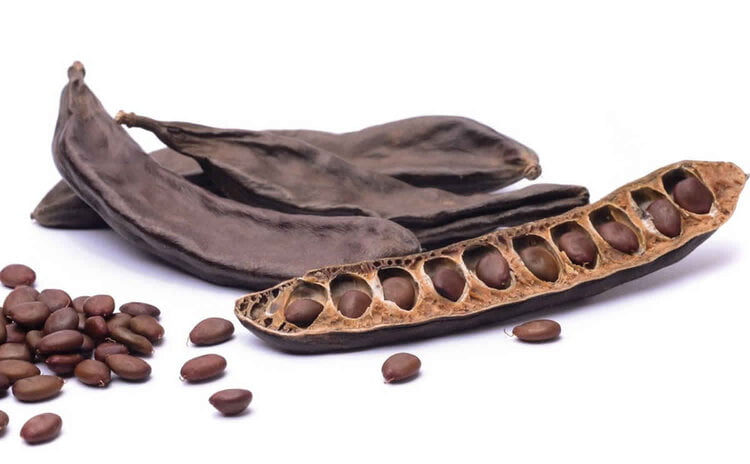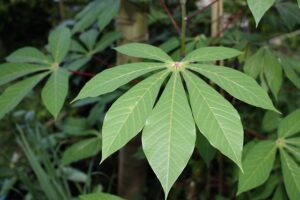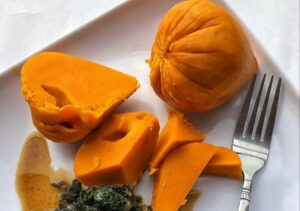African locust bean is a common spice that adds flavor to meals in West Africa.
It is a seed that grows on the Parkia biglobosa tree – also known as the African locust bean tree. The tree is renowned for its amazing health benefits and all its different parts are beneficial to mankind.
In Nigeria and Benin, the fermented locust bean seed is used to flavor soups and stews. In these countries, it is commonly called Iru (Yoruba), Dawadawa (Hausa), Ogiri (Igbo), or Soumbala (Benin).
The bean seeds are very nutritious and can be effective against diabetes, hypertension, anemia, and malnutrition.
Origin of dawadawa (iru)
The Parkia biglobosa tree is a leguminous plant that originated from Africa. It belongs to the family Fabaceae and is a member of the Parkia species.
The tree grows leaves, fruits, and pods. Each pod contains about 25 – 35 seeds that are usually green when immature.
Although the seeds and fruit pulp are popular because of their culinary uses, the other parts of the tree such as the bark, roots, and stems all have significant medicinal roles in African traditional medicine. They are often used to treat diabetes, malaria, diarrhea, wounds, and dental carriers.
Production of dawadawa (iru)
To produce dawadawa, the raw seeds are initially boiled for 12 – 24 hours until they are tender. The seeds are then dehulled by pounding gently in a mortar or rubbing with both palms.
The second step involves washing and reboiling the dehulled seeds for 1 hour. After reboiling, the seeds are covered with banana leaves and allowed to ferment for 3 – 4 days at ambient temperature.
Fermentation is indicated by the production of an ammonia-like smell that results from the breakdown of protein and amino acids. The fermented product is rich in protein, sticky, dark brown, and has a strong aroma.
Finally, the fermented bean seeds are molded into round balls – to be dried or sold fresh at the local markets.
Health benefits
African locust bean is a miracle tree. The following are the possible health benefits:
1. Rich in nutrients
Fermented locust beans are rich in protein. The seeds contain about 39% protein, 27% fats, and 16% carbohydrates. [1]
The bean seeds are also rich in calcium, potassium, iron, phosphorus, manganese, copper, and B-vitamins like thiamine.
It is a great alternative to animal protein and a good source of nutrients for everyone.
2. Has strong antioxidant activity
Antioxidants are compounds that protect your body against free radicals that play a role in diabetes, heart disease, and other diseases.
Dawadawa (Iru) is particularly rich in antioxidants like phenols (catechins) and flavonoids. [2]
These compounds are responsible for their antioxidant effects and help to prevent metabolic diseases.
3. Stabilizes blood pressure
The rich antioxidant content of fermented locust beans is responsible for its effects on blood pressure.
Catechins a type of phenol, are abundant in the seeds of African locust beans.
Studies have found that these compounds reduce oxidative stress and promote dilation of the blood vessels – leading to a reduction in blood pressure. [3]
4. Lowers blood sugar levels
African locust bean’s rich content of antioxidants is also responsible for its anti-diabetic effects.
One study found that extracts of Parkia biglobosa showed a hypoglycemic effect on animal models and reduced the number of low-density lipoproteins (LDL) found. [4]
Another study found that extracts of African locust bean reduced insulin resistance, improved insulin secretions, and lowered blood sugar levels in animal models. [5]
Since fermented locust beans are rich in iron and other essential nutrients, adding locust beans to your diet will help to prevent anemia.
5. Prevents anemia
Anemia is a condition in which there is a deficiency of red cells or hemoglobin in the blood, resulting in pallor and weariness.
Since fermented locust beans are rich in iron and other essential nutrients, adding locust beans to your diet will help to prevent anemia.
In addition, one study found that a combination of African locust beans and other local foods may help prevent anemia and malnutrition in children. [6]
6. Great in pregnancy
African locust bean is rich in protein, calcium, iron, and other essential nutrients needed for the proper growth and development of the baby.
Consuming dawadawa (iru) during pregnancy may help prevent gestational diabetes and anemia in pregnancy.
It is highly recommended as a good protein and calcium source for vegans and vegetarians.
Also read: Best Nigerian foods to eat during pregnancy and what to avoid
Culinary uses
The strong aroma and taste dawadawa gives to African stews and soups gives it an award as the “Queen of all fermented foods”
The seeds can fit into all your favorite delicacies. You can add it to your soups, stews, vegetable fish soups, jollof rice, and pastries.
Also, you can simply brew the raw seeds and drink them as an alternative to coffee. Some tribes in Ghana even add it to their plantain-flavored chocolate cakes.
African locust bean is a highly versatile food. Before the advent of seasoning cubes, it was the African seasoning of choice.
Side effects
Daily consumption of the fermented seeds of African locust beans has shown no side effects in humans.
However, the raw seed pods have been in use by local farmers to harvest fish and have been found to cause poisoning in some fish species. [7]
The bottom line
African locust bean is a nutritious but underutilized food seasoning that is rich in protein and other essential nutrients.
It is great for your health and can help prevent diabetes, hypertension, anemia, and malnutrition.
Additionally, it is a rich source of protein and calcium for pregnant women, the elderly, and vegans.
Do you enjoy locust beans? Leave your comments below and don’t forget to share!
- Oluwaniyi O. et al. Nutritional and amino acid analysis of raw, partially fermented, and completely fermented locust bean (Parkia biglobosa) seeds. ajol.info/index.php/ajfand/article/view/
- Saleh M. et al. Genus Parkia: Phytochemical, Medicinal Uses, and Pharmacological Properties. ncbi.nlm.nih.gov/pmc/articles/
- Galleano M. et al. Hypertension, nitric oxide, oxidants, and dietary plant polyphenols. pubmed.ncbi.nlm.nih.gov/
- Odetola A. et al. Possible antidiabetic and antihyperlipidaemic effect of fermented Parkia biglobosa (JACQ) extract in alloxan-induced diabetic rats. pubmed.ncbi.nlm.nih.gov
- Ibrahim M. et al. Butanol fraction of Parkia biglobosa (Jacq.) G. Don leaves enhance pancreatic β-cell functions, stimulates insulin secretion, and ameliorates another type 2 diabetes-associated complication in rats. pubmed.ncbi.nlm.nih.gov/26911526/
- Ijarotimi et al. Protein quality, hematological properties, and nutritional status of albino rats fed complementary foods with fermented popcorn, African locust bean, and bambara groundnut flour blends. pubmed.ncbi.nlm.nih.gov/23198016/
- Abalaka S. et al. Histopathologic changes in the gills and skin of adult Clarias gariepinus exposed to ethanolic extract of Parkia biglobosa pods. onlinelibrary.wiley.com/doi/abs/
Get new free and exclusive health tips delivered straight to your inbox!




